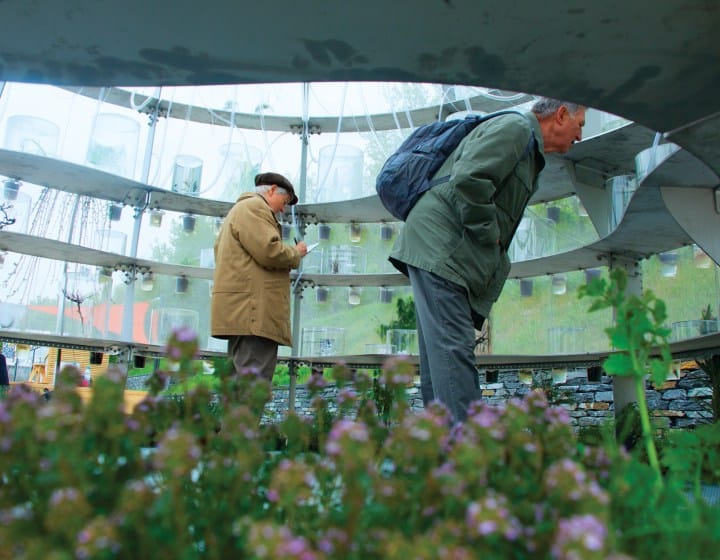Janet Laurence in 2017
‘Inside The Flower’ at The Internationale Gartenausstellung, Berlin
01.01. - 15.10.2017

An experiential contemporary medicinal garden that immerses one into the historical, spiritual and mythological relationship with psychotropic plants. An invitation to understand the being of medicinal plants in a time when of biochemical intelligence, and its place in nature and history with man is being reconsidered.
The total work forms a living and museological Wunderkammer. Artwork elements form a link between historical folklore and our current use of medicinal plants, all centered around their natural toxicity. The elements within form both a botanical display and a laboratory-like performative space. Overhead is an infated translucent water bubble which appears to connect with tubes and hanging vials of plant fuids contributing to the total alchemical, scientifc, laboratory language of the space.
The project aims to communicate to audiences about specifc medicinal herbal plants and their mythologies, their medicines and cures, as well as providing the opportunity to observe the beauty and wonder of botanical specimens and their biological systems. Surrounding the exterior of the pavilion is a delicate laboratory type garden of medicinal plants, supported and planted into transparent containers, scripted with their common and scientifc names. Around the interior of the work, curving shelves house cellular clusters a museological content around the internal circumference. Botanical specimens, laboratory glass containing plant matter and fuids, photographic and drawing images 3D printed and cast and sculptural elements, charts and texts are curated and assembled combining multiple ways of experiencing and viewing the story and biological systems of the selected medicinal plants that reference the rich botanical history.
Texts of prominent German botanical fgures including locally famed BerlinBotanist Louis Lewin whose extensive writings on stimulating plants and their power of affect over the mind, he termed ‘THE PHANTASTICA’. Other historical fgures and their writings include Hildegard von Bingen, and the historical herbal botanical drawings by the pioneer physician, Leonard Fuchs. Other content will be based on research connected to scientifc institutions specifcally Freie University of Berlin, Dahlem Centre of Plant Sciences, The Botanical Museum Berlin and in consultation with experts from these institutions including Kathrin Grotz and Professor Matthias Melzig.
Subscribe to our Newsletter
Sign up to be the first for exclusive gallery news, international events, opening information and updates on our artists.